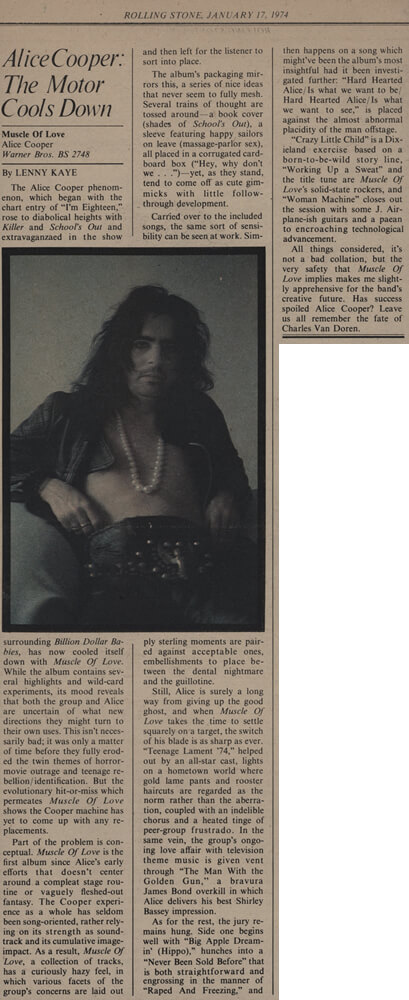Article Database
Alice Cooper: The Motor Cools Down
Muscle Of Love
Alice Cooper
Warner Bros. BS 2748
The Alice Cooper phenomenon, which began with the chart entry of "I'm Eighteen," rose to diabolical heights with Killer and School's Out and extravaganzaed in the show surrounding the Billion Dollar Babies, has now cooled itself down with Muscle Of Love. While the album contains several highlights and wild-card experiments, its mood reveals that both the group and Alice are uncertain of what new directions they might turn to their own uses. This isn't necessarily bad; it was only a matter of time before they fully eroded the twin themes of horror-movie outrage and teenage rebellion/identification. But the evolutionary hit-or-miss which permeates Muscle Of Love shows the Cooper machine has yet to come up with any replacements.
Part of the problem is conceptual. Muscle Of Love is the first album since Alice's early efforts that doesn't center around a compleat stage routine or vaguely fleshed-out fantasy. The Cooper experience as a whole has seldom been song-orientated, rather relying on its strength as soundtrack and its cumulative image-impact. As a result, Muscle Of Love, a collection of tracks, has a curiously hazy feel, in which various facets of the group's concerns are laid out and then left for the listener to sort into place.
The album's packaging mirrors this, a series of nice ideas that never seem to fully mesh. Several trains of thought are tossed around - a book cover (shades of School's Out), a sleeve featuring happy sailors on leave (massage-parlor sex), all placed in a corrugated cardboard box ("Hey, why don't we . . .") - yet, as they stand, tend to come off as cute gimmicks with little follow-through development.
Carried over to the included songs, the same sort of sensibility can be seen at work. Simply sterling moments are paired against acceptable ones, embellished to place between the dental nightmare and the guillotine.
Still, Alice is surely a long way from giving up the good ghost, and when Muscle Of Love takes time to settle squarely on a target, the switch of his blade is as sharp as ever. "Teenage Lament '74," helped out by an all-star cast, lights on a hometown world where gold lame pants and rooster haircuts are regarded as the norm rather than the aberration, coupled with an indelible chorus and a heated tinge of peer-group frustrado. In the same vein, the group's ongoing love affair with television theme music is given vent through "The Man With The Golden Gun," a bravura James Bond overkill in which Alice delivers his best Shirley Bassey impression.
As for the rest, the jury remains hung. Side one begins well with "Big Apple Dreamin' (Hippo)," hunches into a "Never Been Sold Before" that is both straightforward and engrossing in the manner of "Raped And Freezing," and then happens on a song which might've been the album's most insightful had it been investigated further: "Hard Hearted Alice / Is what we want to be / Hard Hearted Alice / Is what we want to see," is placed against the almost abnormal placidity of the man offstage.
"Crazy Little Child" is a Dixieland exercise based on a born-to-be-wild story line, "Working Up A Sweat" and the title tune are Muscle Of Love's solid-state rockers, and "Woman Machine" closes out the session with some J. Airplane-ish guitars and a paean to encroaching technological advancement.
All things considered, it's not a bad collection, but the very safety that - Muscle Of Love implies makes me slightly apprensive for the band's creative future. Has success spoiled Alice Cooper? Leave us all remember the fate of Charles Van Doren.




